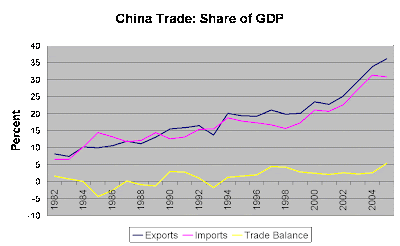Free trade has been a major source of world growth in recent decades. China, in particular, has been a major beneficiary of free trade, with exports to the United States and elsewhere serving as a major driver of Chinas economic development, as the following figures demonstrate.

Trade, and the trade balance, have grown over time in their contribution to GDP.

In the long run, the world economy benefits from free trade. It allows for increased specialization, as countries focus on producing the goods and services for which they have a comparative advantage, freeing up resources that would otherwise be used inefficiently in producing other goods or services. But in the short run, not everyone benefits. And in democracies, the short-term loosers from free trade can form powerful groups to lobby the Government to protect their particular industry. Unfortunately, the US version of democracy appears particularly prone to this form of "rent seeking" behaviour, even though in the long run, giving in to the lobbiests is not even in America's best interests.
The recent elections in the US, won convincingly by the Democrats, likely spell more trouble for free trade in the future; Democrats historically are more likely to favour protectionist policies, and Republicans free trade- although there are clear exceptions (Bill Clinton, a Democrat president, oversaw more free-trade legislation than George Bush, a Republican).
The long-term effects of these changes are likely to lower the growth rate of the world economy, with developing countries that are heavily dependent on trade for their growth like Mainland China suffering the largest fall in growth.
More cheerful outcomes are possible, however. It is possible that the share of consumption in GDP may grow in future, potentially helping to make up for the lack of foreign demand. Given that consumption constituted only about 38% of GDP in Mainland China in 2005 (compared with 70% for most developed economies), there's a lot of scope for consumption demand to grow in importance in the future.
2 comments:
I believe globalisation is good to developing countries in the long run. But in the short run what measures should be done to compensate the loss of profit of local companies whose products are not as competitive as those from developed countries?
This is an excellent question that I will follow up in a later post.
Post a Comment